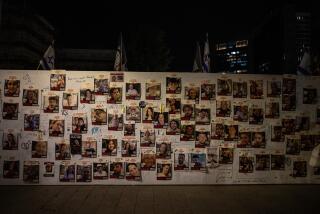The Red Badge of Spinmeistering
- Share via
Summing up the post-election legal maneuvers in Florida, a George W. Bush advisor told one reporter: “This is war!” Similarly, Newsweek quoted Al Gore campaign manager Donna Brazile as saying, “This is war without bloodshed,” and damning the Republicans for their “guerrilla tactics.” And in the aftermath of Gore’s courtroom reverses, nearly everyone has applied the term “last-ditch” to his latest actions. That term originated hundreds of years ago, referring to the final line of defense in a desperate battle.
There’s a good reason for the military metaphors. Politics really does resemble warfare in important ways, especially during hard-fought elections. Both are organized struggles involving masses of participants, big risks, high stakes and elaborate strategies. Future historians will note that the choice of a president in 2000 hinged on a handful of partial punch-holes--the infamous chads. That outcome would not have surprised Carl von Clausewitz, the Prussian military theorist of the early 19th century. In his classic “On War,” he wrote that the course of a battle can change because of muddy roads, broken wagon wheels and “minor incidents--the kind you can never really foresee.”
Or as Ben Franklin might put it, for want of a sharp stylus, the battle was lost.
During wartime, opposing generals use mind games. In the 19th century, French military theorist Charles Ardant du Picq wrote: “Make the enemy believe that support is lacking; isolate; cut off, flank, turn, in a thousand ways make his men believe themselves isolated.” During the Gulf War, the United States and its allies air-dropped pamphlets telling Iraqi soldiers that they had no chance.
Ever since Florida certified Bush as the winner, Republicans have been using comparable tactics, barraging Democratic politicians with letters and e-mails urging them to tell Gore to concede.
Psychological warfare also accounts for the Gore camp’s efforts to stir anger over Republican “intimidation” of vote counters in Miami. Niccolo Machiavelli knew the tactic well. To animate troops with a desire to fight, he said, “it would be good first to enrage them against the enemy.” In politics, angry troops are likely to “fire off” checks, which is what Gore needs to finance his legal battle. As the ancient Greek historian Thucydides wrote: “War is not so much a matter of armaments as of the money which makes armaments effective.”
Money and motivation made a big difference in the weeks before the election. Fearing the worst from the other side, interest groups supporting each candidate poured huge sums into get-out-the-vote efforts. The Democrats were especially effective, which may account for Gore’s last-minute surge. Gore also rallied the troops by depicting Bush as an ogre indifferent to hate crimes in his own state. The Sunday before the election, he told a prayer breakfast: “I am taught that good overcomes evil if we choose that outcome. . . . I feel it coming.”
This post-election battle may be unusual for U.S. presidential politics, but it represents a phenomenon familiar to warriors. In many conflicts, the losers regroup in hopes of positioning themselves for the next fight. Clausewitz wrote: “Even the ultimate outcome of a war is not always to be regarded as final.”
If that line seems prophetic, consider the weeks and months ahead. With a president who won less than half the popular vote and the most closely divided Congress in decades, there is a strong chance that interparty combat will intensify as a new administration takes office. Liberal activist Fred Wertheimer says: “Everybody has to start thinking, start preparing and be ready to battle starting in January.” The first casualties are likely to occur as the split Senate takes up controversial nominations to high office.
Both sides would do well to remember the words of British military analyst B.H. Liddell Hart: “The more brutal your methods, the more bitter you will make your opponents, with the natural result of hardening the resistance you are trying to overcome.”
More to Read
Sign up for Essential California
The most important California stories and recommendations in your inbox every morning.
You may occasionally receive promotional content from the Los Angeles Times.










